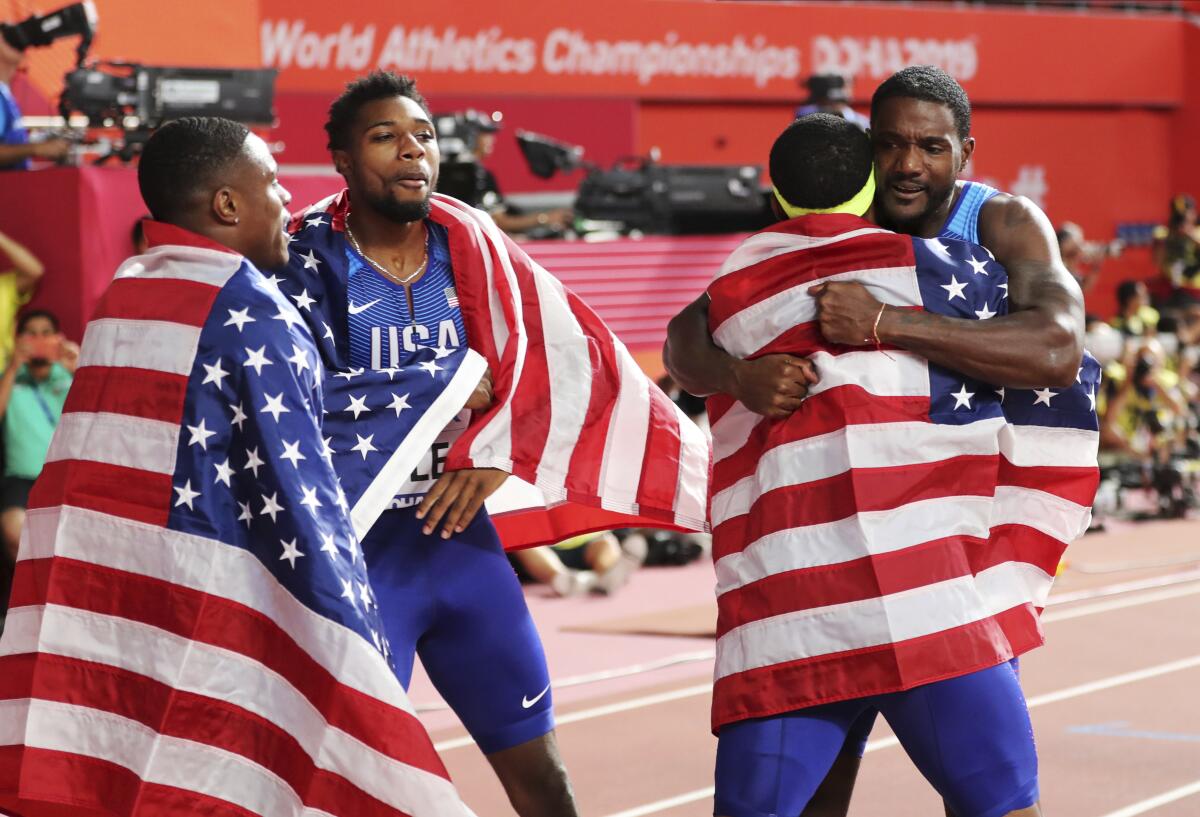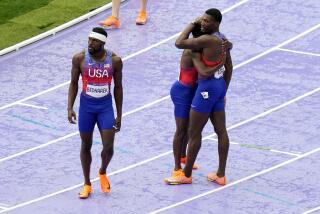American men win 400-meter relay at world track championships

- Share via
DOHA, Qatar — Noah Lyles let out a huge scream and kept right on running — through the finish line and straight toward his teammate, Christian Coleman. After a quick hug, Lyles stuck the baton out and Coleman grabbed hold, too.
Nobody was letting it go.
Motivated by a team meeting in the morning, then propelled by sticky-fingered flawlessness at night, the American men overcame the country’s longest and most-notorious track jinx to win gold at the world championships Saturday in the 4x100 relay that has bedeviled this team for decades.
“We broke the curse. We broke the curse,” Lyles yelled into the microphone during his on-track interview. ”U-S-A. We’re taking all the golds! All of them.”
Their first sprint relay win at worlds since 2007 — the pre-Usain Bolt days — made the U.S. men 3 for 3 in the sprints. The winning started a week ago with Coleman’s romp in the 100, and continued Tuesday with an equally impressive win from Lyles in the 200.
Then, this: A win that was anything but pre-ordained, despite the clear advantage the Americans held in raw speed.
It takes teamwork, too.
Three times, the Americans passed the baton — from Coleman to Justin Gatlin, from Gatlin to Mike Rodgers, and from Rodgers to Lyles — and with nary a hiccup in any of the exchanges. The clean exchanges allowed that raw speed to take over.
Sign up for our free sports newsletter >>
Still pumped more than an hour after the race, Lyles provided his own play-by-play.
“I saw the first handoff and I was, like `Dang,’ then I saw the next one and it was, `Dang,’ then, I’m like `Ooh,“’ he said. ”Then I got the baton and I’m thinking, `I’ve got to run fast.’ They’re over there doing magic and I’m just trying to make it all worthwhile.”
It put an exclamation point on a night that had its share of good and bad for the U.S.
Good: Joe Kovacs pulling an upset over his teammate, Ryan Crouser, for a 1-2 U.S. finish in the shot put.
Bad: A false start by Olympic champion Brianna McNeal in the 100-meter hurdle heats — “I didn’t false start,” she insisted to the judges before leaving the track (but she did). And Brittney Reese’s surprisingly early exit from the long jump, meaning she won’t be in the final to defend her title Sunday.
Including the women’s relay bronze medal in a race won going away by Shelly-Ann Fraser-Pryce and Jamaica, the United States heads into the final day with 11 gold medals, and 25 overall. It will be a stretch to match the record total of 30 from two years ago in London.
Other gold medals went to Yulimar Rojas of Venezuela in the triple jump and Kenya’s Hellen Obiri in the women’s 5,000 meters.
Obiri held off a charge from eventual bronze medalist Konstanze Klosterhalfen, whose coach is Pete Julian, an assistant at the Nike Oregon Project — the team run by Alberto Salazar, the famed long-distance guru who was kicked out of the meet last week after receiving a doping ban.
American Dalilah Muhammad broke her own world record in the 400-meter hurdles Friday night, circling the track in 52.16 seconds at the world championships.
Sifan Hassan, who was a Salazar athlete, became the first person to complete a 1,500-10K double at worlds, running the shorter race Saturday in 3 minutes, 51.95 seconds to demolish a top 10 that included six other athletes who set personal bests.
The result brought with it some immediate trolling on social media.
”That was the best women’s championship field in history. And one person dominated,” tweeted Steve Magness , the former assistant of Salazar’s who was one of the key whistleblowers in the doping case.
Hassan wasn’t in the mood for apologies.
“If they want to test me, they can test me every single day,” she said. ”I believe in clean sport. I believe in Alberto. Since I’ve been with him, I’ve worked really hard, and that’s what I know.”
The harshest of the doping sticklers will be quick to point out that Gatlin (two bans), Rodgers (nine-month ban in 2012) and Coleman (convoluted whereabouts case dismissed last month) also have some baggage in that area.
But their win Saturday had more to do with a different kind of history.
The U.S. string of relay nightmares dates back to 1995, before Coleman or Lyles were born, and has also included the last three Olympics. Over the 18 world and Olympic relays held during stretch, the U.S. has dropped the baton or failed to finish nine times.
Part could be attributed to the stress of competing against Bolt, who is now long gone from this sport. But in a sign of how long this spell has existed, this marked the first relay gold for Gatlin, who is 37 and has been racing at this level since 2004 — four years before Bolt started making his imprint.
“We had been just right outside the window, just barely not getting the job done,” Gatlin said. ”At some point, I felt like maybe it was me.”
More to Read
Go beyond the scoreboard
Get the latest on L.A.'s teams in the daily Sports Report newsletter.
You may occasionally receive promotional content from the Los Angeles Times.











